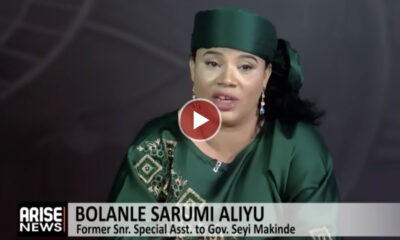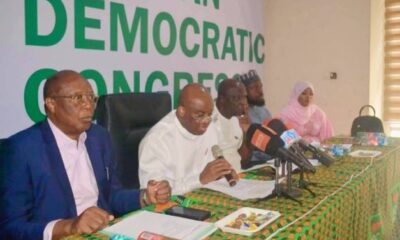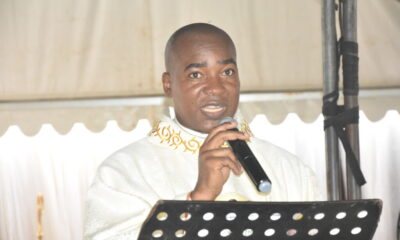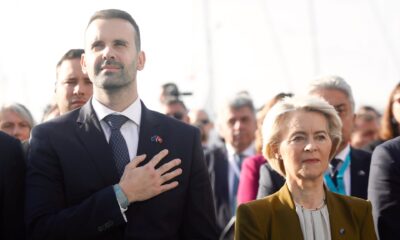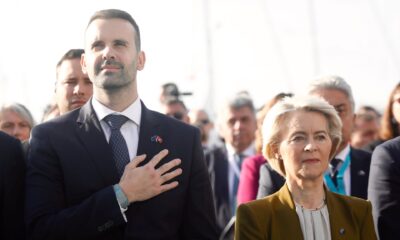World
Stakeholders Urge Reform of Nigeria’s Social Development Act

The European Union and the International Institute for Democracy and Electoral Assistance (IIDEA), along with various stakeholders, have called for an urgent review of Nigeria’s Social Development Act (SDA). This demand arose during the National SDA Summit held in Abuja, where participants expressed concerns that the current framework is inadequate for supporting vulnerable groups and achieving inclusive growth.
Originally enacted in 2004, the SDA was designed as a comprehensive framework for social development in Nigeria. However, stakeholders argue that it no longer reflects the current realities facing the nation. The summit, funded by the European Union as part of its CSOs-Bridge Strengthening Project, aimed to draw attention to these critical issues.
Hon. Valentina Enih, Enugu State Commissioner for Children, Gender and Social Development, delivered a keynote address highlighting the need for reform. She stated, “The Act is older than many of us. Outdated provisions and emerging social challenges demand urgent reform.” Enih emphasized the importance of unity among civil society organizations (CSOs), stressing that personal interests often undermine collective goals. “One stick is easily broken, but a bundle of broomsticks is not. We must speak with one voice,” she urged, calling on lawmakers to increase funding for ministries responsible for women’s affairs, poverty eradication, and social protection.
Idem Akpan Udoekong, Project Manager of the EU Strengthening Bridge Project, noted the summit’s significance in reviving national interest in the neglected Social Development Act and Policy. He pointed out that CSOs are crucial for addressing gaps in education, healthcare, civic values, and community development. These organizations often fill voids where government services are lacking.
The timing of the summit coincided with the global 16 Days of Activism campaign, which seeks to combat gender-based violence. Udoekong highlighted that updating the SDA would improve coordination on gender issues and enhance responses to social challenges.
Hon. Victor Obuzor, Chairman of the House Committee on Civil Society Organisations and Development Partners, stated that reviewing the SDA is a priority for the National Assembly. He noted, “Fragmentation, institutional reassignments, and multiple regulatory frameworks have weakened the effectiveness of the Social Development Act.” Obuzor mentioned the committee’s efforts to engage stakeholders and support the creation of a modernized civil society regulatory bill.
Peter Audu, Deputy Director at the Ministry of Humanitarian Affairs and Poverty Reduction, affirmed that the summit aligns with federal reforms aimed at promoting gender equality and social cohesion. “This forum provides an important opportunity to consider proposed amendments and develop a national coalition for sustainable financing and measurable results,” he said.
Dr. Fumi Akinyele, CEO of the Accountability and Transparency Initiative, stressed the necessity for the revised law to incorporate gender responsiveness from its inception. She pointed out that many rural women are excluded from social protection programs due to requirements such as smartphones and digital literacy. “Inclusion must go beyond words. We need clear definitions, gender-responsive budgeting, and disaggregated data to effectively address these issues,” she added. Akinyele called for balanced committees that ensure diverse voices are heard during the reform process.
Prince Chris Azor, Chairman of the Anambra Civil Society Network, shared challenges faced by sub-national CSOs, including inconsistent regulations that have previously led to the closure of community organizations’ bank accounts. He advocated for the amended Act to provide states with a clear legal framework for social protection and civil society participation, saying, “We want a standing law that expands civic space and ensures citizens are part of governance.”
Additionally, Harry Udo, Team Lead of the Ethics and Good Leadership Awareness Initiative, suggested that harmonizing registration and regulatory procedures under the SDA could grant CSOs the same legal status as entities registered with the Corporate Affairs Commission. This change would help expand civic space and enhance operational capacity at the grassroots level.
The summit concluded with a call for a declaration aimed at guiding states toward creating a coherent and supportive environment for civil society across Nigeria.
-

 World1 month ago
World1 month agoCoronation Street’s Shocking Murder Twist Reveals Family Secrets
-

 Entertainment1 month ago
Entertainment1 month agoAndrew Pierce Confirms Departure from ITV’s Good Morning Britain
-

 Entertainment5 months ago
Entertainment5 months agoKate Garraway Sells £2 Million Home Amid Financial Struggles
-

 Entertainment4 months ago
Entertainment4 months agoAnn Ming Reflects on ITV’s ‘I Fought the Law’ Drama
-

 World2 months ago
World2 months agoBailey Announces Heartbreaking Split from Rebecca After Reunion
-

 Entertainment1 month ago
Entertainment1 month agoDavid Jason and Nicholas Lyndhurst Eye Reunion for Only Fools Anniversary
-

 Entertainment2 months ago
Entertainment2 months agoCoronation Street Fans React as Todd Faces Heartbreaking Choice
-

 Health4 months ago
Health4 months agoKatie Price Faces New Health Concerns After Cancer Symptoms Resurface
-

 Entertainment1 month ago
Entertainment1 month agoBradley Walsh Sparks Strictly Come Dancing Hosting Speculation
-

 Entertainment4 months ago
Entertainment4 months agoCoronation Street’s Carl Webster Faces Trouble with New Affairs
-

 Entertainment1 month ago
Entertainment1 month agoTwo Stars Evicted from I’m A Celebrity Just Days Before Finale
-

 World1 month ago
World1 month agoKevin Sinfield Exceeds Fundraising Goal Ahead of Final Marathons



